Brazil. Recognising Dignity.
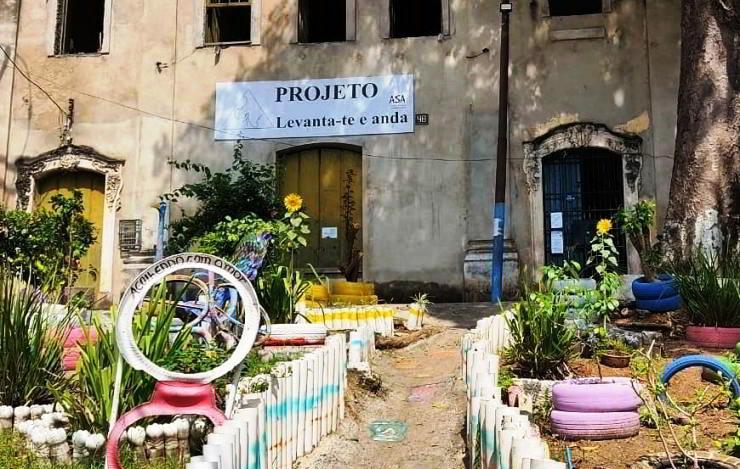
A place where you can feel at home, welcomed and listened to. An island of refuge, in the turbulent sea of life. The project is called Get Up and Walk, in Salvador de Bahia. Emma Maribel Chiolini a young lay Comboni missionary who works on the project, tells us about it.
Imagine a place where all the people who live on the streets can enter without obstacles, without cardboard boxes under their arms and fear. A place where they are welcomed with affection and called by name, with an attentive ear, that listens to their stories, their outbursts, their fears, and their desires. A place where they can drink a coffee, find a towel, a new shirt, a medicine for pain. Where there are no faults and mistakes, but opportunities to learn and forgive, where everyone makes laughter and crying a common experience, a manual for life. This place exists and is called: Project ‘Levanta te e anda’, Get up and walk, in Salvador, Bahia.
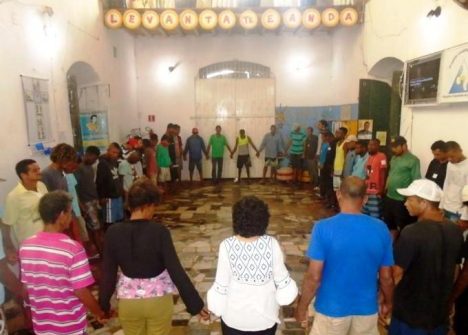
“A place where they are welcomed with affection and called by name” Photo: Facebook
The project was born in 2008 and has become a day centre of reference for many people who are in a street situation, a space that over time has become an island of refuge in the turbulent sea of street life. It operates in a place that was previously abandoned, the church of San Francisco de Paula, in the Agua de Meninos neighbourhood, in the lower city, near the port and the fish market. Those who attend the project benefit from various services: health care, help with documents, placement in the job market, personal hygiene service, haircuts, human training activities, assistance with social services, food and time for rest which is very important in coping with the nights spent on the street, sleepless due to violence and the difficulty of finding a quiet place to sleep.
I have been a volunteer in the project since 2022, but I already knew it through the Trindade Community where I lived and which I frequent, as my community in Salvador.
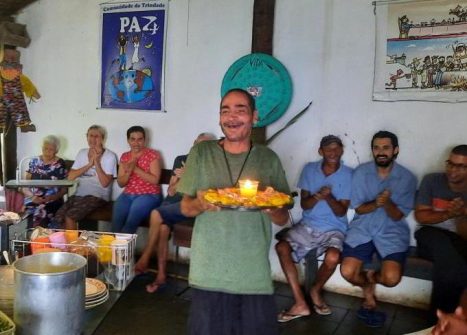
Birthday celebration for one of the centre’s regular visitors. Photo Facebook
The Trindade Community welcomes people who live on the streets, who come to the project and who want, after a period of attending the day centre, to leave the street and begin a journey of coexistence in the community. The people who attend the centre are mostly adult men, aged 20 to 50. The centre is also open to women though there are not many. Their female universe is very complex, linked to prostitution and the control or ‘protection’ of those who profit from it.
In fact, most women accept having someone who ‘protects’ them, because as a young woman said: “I prefer having only one person beating me, to being raped by five”.
The name ‘Levanta te e anda’ is an invitation to those who live on the street. In the streets, on the sidewalks, we live lying down, on the ground, physically lying down, inside a cardboard box, on the hard and cold concrete, holding out an empty hand in the hope of bread,
some soup or a blanket.
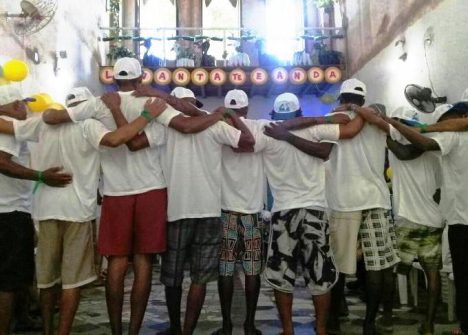
The name ‘Levanta te e anda’ is an invitation to those who live on the street. Photo: Facebook
Seen as of little value, we have no self-confidence because of the many wounds of life. Anaesthetized by alcohol and drugs, we survive hoping for something that comes from outside, from above, from others, an attitude that does not help.
The “Get up and walk!” concept resonates as: “Believe in your worth! You have ability, courage, determination! Get up! Feel the life that wants to blossom in you!”. This is the motto signified by all our activities among the population in street situations; accept this invitation that says: Get up and walk! Just as Jesus said.
What the Community and the day centre propose is to inspire, and reawaken the desire to get up again and walk with your head held high, with dignity and self-esteem. On Tuesday afternoons we carry out a human training activity, which touches on topics such as self-esteem, communication, teamwork, resilience, empathy, work and game dynamics in Portuguese, to improve our grammar.
To start a meeting, we always form a circle. The circular dimension allows us all to look each other in the eye and meet the gaze of the others. Nobody turns their backs but we are all at the same level, we can all participate; the circular form is supportive and creates proximity.
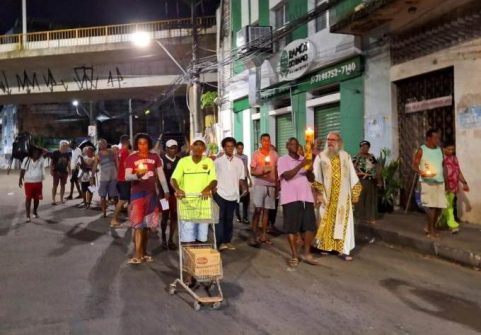
A procession through the streets of the neighbourhood of Agua de Meninos. Photo Facebook
It is a space that is ‘ours’ as I always define it with them, because we can talk and compare, each one learns to listen to the other’s point of view and respect it, even if they don’t agree; this is the fundamental basis of each of our meetings. Being listened to, and expressing your opinion, in a reality that makes you invisible; it is a force that allows you to become aware of yourself and your existence. I consider the project a small community, where we compare, share and learn from each other. I myself am learning with these masters of life, of stories and of knowledge. We broadcast tiny seeds, but then it is the person who must plant and take care of the seeds so that they can germinate and flourish. And the work continues with the Comunidade Trindade, a space of life, of welcome, of resurrection, where the rules of coexistence, of collective and personal work, of moments of spirituality and of a community journey meet and where you also learn to become a supporting hand. (Open Photo: Facebook)



